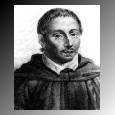

Italian composer, organist and diplomat. A member of a noble family, Cavalieri probably studied music with his father, Tommaso. By 1578 he held a position as an organist. Ferdinando de' Medici, upon becoming Grand Duke of Tuscany in 1588, hired him as overseer of musical activities at his court; his duties included sumptuous productions of intermedii. During the 1590s Cavalieri became increasingly involved in diplomatic activities, which took him frequently to Rome. In 1600 the musical festivities in Florence surrounding the wedding of Henry IV and Maria de Medici included Cavalieri's La contesa fra Giunone e Minerva. He is best known for his Rappresentatione di Anima, et di Corpo (Rome, 1600), an important early work in the development of the new recitative style and in the history of the oratorio. Although Ottavio Rinuccini claimed in 1600 that he and Peri were the first to use the stile rappresentativo, Cavalieri was experimenting with the declamatory style at about the same time. in 1601 Peri reported that it was Cavalieri "before any other" who "enabled us to hear our kind of music upon the stage."